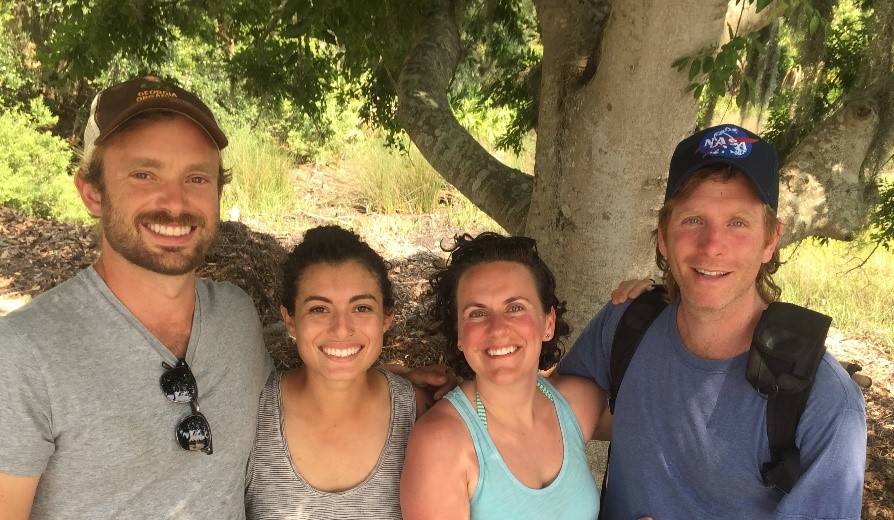By Billy Mitchell, FSMA Training Coordinator
Billy Mitchell is the FSMA Training Coordinator for National Farmers Union and one of the newest members of the Local Food Safety Collaborative team. As Training Coordinator, Mitchell travels across the country helping farmers and processors learn about FSMA and what they can do to increase food safety on their operations.
A few weeks back I had the opportunity to drive across Georgia with Cara Faver from the National Young Farmers Coalition. Cara and I discussed a lot on our trip, including veggies, goats, cows, and market sales. The main topic of conversation on our trip, however, was food safety.
With FSMA inspections getting closer, combined with the recent E. coli outbreaks, both buyers and the general public are more interested in how growers are practicing food safety on their operations. It’s a pretty safe bet that when you ask a vegetable grower what’s on their mind, food safety almost always comes up.
We visited a wide array of farms on our trip, including small urban farms in Atlanta like Freewheel Farm, suburban neighborhood farms like Bamboo Creek, and “radically traditional” farms like White Oak Pastures in Bluffton. We even took a ferry to visit the folks that feed the staff and guests of Greyfield Inn on Cumberland Island. At each farm we found great humans, beautiful produce, and folks ready and willing to share their experiences with, and learn more about, food safety.
Matthew Bagshaw and Christi Hansen run Hungry Heart Farm just outside of Atlanta, and according to Bagshaw, “food safety on [the] farm is kind of a big deal.” The reason? They’ve got some real cute neighbors next to their farm, baby goats! However cute the baby goats are, they don’t kid around when it comes to food safety. “[We] are growing vegetables on land leased from a goat dairy,” said Bagshaw, “the potential for cross-contamination could be huge.” According to Bagshaw, employees of the farm are cautious not to walk through the animal areas and then into produce fields without changing their footwear. In addition, they keep buffer zones between where the goats are and where they grow their veggies. While these extra steps can take up time spent in the field and reduce space where veggies can grow, they know that focusing on a safe product is more important than maximizing profit. Like a lot of the farmers we met, Hungry Heart is working on selling more wholesale. Bagshaw says developing “a comprehensive food safety plan is kind of a no-brainer and a win-win scenario” to help them achieve that goal.

Many of the farmers we visited know their customers personally. They want them to enjoy their produce and feel that they are consuming a safe product. Monica Ponce and Russel Honderd run Greyfield Gardens on Cumberland Island. Ponce says they run a clean operation so their customers “don’t worry about E. coli on our produce…[and] can simply enjoy the food.” Ponce and Honderd make sure to clean and sanitize their bins and knives and focus on good post-harvest handling practices.
Lindy Kloepfer at Little Fox Farm in Douglasville has a view of food safety that most growers can agree with. According to Kloepfer, “common sense food safety practices like sanitizing bins, sinks, and knives before every harvest can be tedious,” but most growers she knows follow these practices because “it’s important for the safety of us and our customers.” Sed Rowe, who farms in Albany, echoed Kloepfer’s thoughts. “Food safety is very important on my farm because it can affect many people when I do not do the correct practices to have healthy produce,” he explained.
Even with a smaller operation, a well-designed wash station can move a lot of produce. On our trip the wash stations we saw were small and simple, but were an area of big focus and pride for the growers.
“For me, it makes sense to treat our produce with a high level of care during post-harvest. We put in the effort when it comes to growing the plants and regenerating our soil. Handling food properly before it gets to your plate only follows suit,” explained Bilal Sarwari of White Oak Pastures. Over at Jenny-Jack Sun Farm owner and operator Jenny Jackson is thinking about how food safety and the infrastructure updates made to her farm will go hand in hand. “Since we are getting ready to build a new wash station, we are looking forward to designing it with good food safety practices in mind,” said Jackson. A good wash station will not only help the flow of produce from harvest to cold storage, but it leaves a good impression on your buyer when they see that you are equipped to pack a lot of produce safely and efficiently.
“While it’s hard for me to get excited about more government regulation on small family farms, I do think that we have a responsibility to our customers to provide the safest and healthiest food possible,” explained Brent Hall of Freewheel Farms. On this trip Cara and I left each farm inspired by how folks do so much with so little. We felt re-committed to the work NYFC and NFU does to ensure farmers have the resources they need to be successful. We’re lucky to be a voice for growers in our discussions with the FDA, USDA, and wholesalers around the country to help those groups understand what works – and what doesn’t – for the folks sustainably growing our food.


